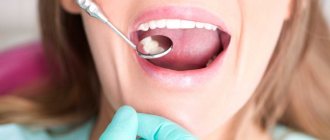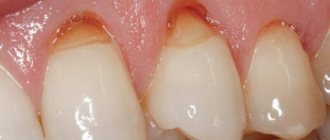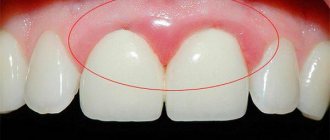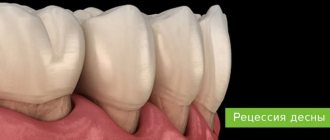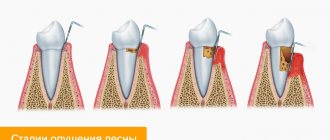Teeth can hurt for various reasons. Often toothache occurs from cold. The following factors influence dental hypothermia:
- The tooth is affected by caries or an inflammatory process has begun in the deep layers of dental tissue and affected the nerve. If the immune system is weakened, the nerve may become inflamed from the cold.
- Cold causes active activity of pathogenic bacteria.
- Due to hypothermia, pathogenic bacteria begin to multiply intensively in the nasal cavities. The inflammatory process can spread from the nose to the teeth. Cold is a favorable environment for the life of pathogenic microorganisms.
- If inflammation of the trigeminal nerve occurs from hypothermia, it is difficult to distinguish it from dental diseases.
- Herpes, which occurs on the lips from hypothermia, can cause inflammation of the nerve endings of the teeth.
Why can teeth react to cold?
There are many reasons why discomfort and pain may occur when drinking cold or hot drinks or food. Most of them are directly related to diseases of the oral cavity, but there are also those that are not directly related to dental pathologies:
- Damage to tooth enamel.
Violation of the integrity of the outer covering of the tooth can be caused by a variety of reasons: frequent consumption of hard and dry food, which scratches the enamel during chewing; - mechanical chips;
- an incorrectly selected toothbrush (doctors recommend using medium-hard brushes for adults and soft-bristled brushes for children);
- eating foods that can negatively affect the condition of enamel (carbonated sweet drinks, sour fruits, food additives, etc.).
is one of the most common causes. The fact is that most people don't even think about the fact that they have tooth decay until a distinct black spot appears on the tooth. In fact, caries in the early stages can only be distinguished by an experienced dentist - a tiny gray dot (and this is what “young” caries looks like), if it is not examined in time and urgent measures are not taken to eliminate it, it first becomes the cause of increased sensitivity, and then acute pain.
. Untreated caries invariably leads to another, even more serious disease - pulpitis - destruction of the soft tissues of the tooth. Naturally, with pulpitis, the dental nerves are exposed, which causes acute pain when eating cold, hot, sweet or sour food.
. If the gums become inflamed, in most cases the subgingival part of the tooth, the dentin, is exposed. Dentin is completely devoid of a protective layer - enamel - therefore, at the slightest contact with cold water, food, or even just cold street air, patients invariably experience discomfort and pain.
If you suspect one of the above reasons, you should not delay visiting the dentist for long - an experienced specialist will quickly identify the problem and prescribe a course of treatment.
Reasons not related to oral diseases include the following:
- any hormonal disorders
and changes in the body. As a rule, such conditions occur while taking hormonal drugs, oral contraceptives, during pregnancy or breastfeeding; - suffered nervous shocks
, life in a state of constant stress, etc.; - deficiency of vitamins
, minerals and nutrients in the body. “Seasonal” sensitivity can often occur - when in spring and autumn, due to vitamin deficiency, many patients begin to complain of a certain discomfort after taking cold or hot; - damage to the immune system
, viral diseases; - endocrine diseases
(disorder of one or more endocrine glands).
If increased tooth sensitivity is caused by these particular pathological conditions, then no special dental treatment is required - the main treatment should be aimed at eliminating the root cause.
If, after a serving of ice cream or a glass of cold juice, you suddenly feel discomfort, which smoothly turns into acute pain, it is quite acceptable to take a tablet of a pain reliever that is suitable for you - this can be Nimessil (powder for dissolving in warm water), Aertal (tablets), Ketonov , Dexalgin.
Symptoms and causes
The scientific name of this pathology is paresthesia. The main symptoms by which one can suspect the onset of the disease are: a burning sensation, the appearance of goosebumps and slight tingling in the soft tissues, numbness of part of the dentition or the entire jaw at once. This condition can be caused by many reasons. It is important to understand that numbness is not always a sign of a developing disease, but it is still worth seeing a doctor.
The main factors that provoke the loss of usual sensitivity: inflammatory processes in the root system, for example, periodontitis, severe injuries to the jaw, problems with the temporomandibular joint and malocclusion, disruption of the work algorithm during installation of implants, poor-quality dental treatment, stress and tension, violation integrity of nerves, etc.
Less common causes today are allergic reactions (to medications used by the dentist or to a sudden change in air temperature) and a significant outflow of blood from the head.
Reaction to cold after dental procedures
Often the cause of a sudden reaction of teeth to cold or hot is recent dental procedures:
- Whitening. In order to understand how this very popular procedure today affects tooth sensitivity, let us recall that whitening (especially done at home or in a suspicious clinic by an inexperienced doctor) can cause severe thinning of tooth enamel. Needless to say, abuse of the procedure invariably leads to damage to the enamel and, accordingly, causes hyperesthesia.
By the way, frequent use of highly abrasive whitening toothpastes can lead to teeth reacting to cold or hot temperatures. If you prefer to use whitening pastes, choose gentle and gentle preparations.If increased sensitivity is the result of excessive whitening, you should first stop using abrasive pastes and contact your dentist to undergo a fluoridation or remineralization procedure.
- Sealing . Most often, after conventional therapeutic treatment of deep caries or pulpitis, patients experience increased tooth sensitivity. The reason for this is the effect on the pulp and nerve endings, after which it is not recommended to drink cold or hot for a few more days. As a rule, there is no acute pain, so the patient can easily cope with the discomfort. If it suddenly turns out that after 2-3 days the sensitivity does not disappear, the discomfort gradually turns into pain, you need to urgently consult a doctor - perhaps an inflammatory process has begun, which needs to be eliminated as soon as possible.
- Prosthetics . During the installation of fixed or removable dentures, tooth enamel can also be damaged.
It is rarely possible to avoid hypersensitivity after dental procedures, so it is recommended to minimize the consumption of cold or hot drinks, ice cream, hot food, etc.
Causes
The causes of dental hyperesthesia can be very diverse, ranging from mechanical damage to the surface of tooth enamel and ending with general disturbances in the functioning of the human body. The most common causes of enamel hyperesthesia are:
- damage to tooth enamel by short-term exposure to organic or mineral acids;
- exposure of dentinal canals as a result of carious and non-carious lesions of teeth;
- disruptions in the functioning of the endocrine system as a result of pregnancy or menopause;
- disturbances of phosphorus-calcium metabolism in the human body;
- previously suffered general or neuropsychological diseases of the human body;
- exposure to ionizing radiation on the human body;
- habit of eating a lot of sour berries, fruits, juices, fruit drinks.
Sensitive tooth enamel occurs when the dentinal tubules become exposed for one or more reasons and a variety of irritants affect the sensitivity of the pulp. In this case, even simple inhalation of cold air or brushing your teeth can cause painful sensations. Teeth in the cervical area are especially sensitive, because the enamel is thinnest there, and if the gum moves away from the tooth, it almost immediately begins to react sharply to various irritants.
Separately, we should dwell on the mechanism of hyperesthesia. As you know, dentin is penetrated by many tiny tubes - the so-called dentinal canals, in which there are processes of nerve cells that are connected to the pulp. Dentinal tubules are filled with fluid that is in constant motion. Any change in the speed of fluid movement causes a pain reaction.
If the enamel is thinned, this leads to exposure of the dentinal tubules, and under the influence of various irritants, the speed of fluid movement in the dentinal tubules constantly changes, causing acute short-term pain, as a result of which the patient complains of very sensitive teeth.
Why does a dead tooth react to cold?
Increased tooth sensitivity is the result of irritation of nerve endings. Accordingly, after removal of the nerve, the tooth should not react in any way to cold or hot. However, in practice the opposite occurs - a “dead” tooth aches, hurts and causes the patient a lot of discomfort. There may be several reasons for this:
- In fact, one of the neighboring, “living” teeth reacts to the cold, although it may seem that it is the pulpless one that hurts. In this case, you need to contact a specialist to figure out why this healthy tooth reacts to cold (damaged enamel, caries, pulpitis, etc.).
- The “dead” tooth was poorly healed. There are times when even an extremely experienced doctor, who has the most modern equipment at his disposal, cannot completely cope with pulpitis in one go due to the banal non-standard structure of the tooth canals. As a result, the nerve is not completely removed, and when you eat cold or hot food, the tooth begins to hurt. To eliminate the sensitivity of such a tooth, it is necessary to take an x-ray and consult a dentist for complete removal of the nerve.
- It also happens that the dental nerve is completely removed, but the canals are poorly sealed - in this case, an inflammatory process begins under the filling, which causes a reaction to cold.
You should also not miss the fact that the cause of a pulpless tooth’s reaction to cold or hot may be an infectious viral disease or hormonal imbalance.
Why do teeth hurt from cold and hot?
The most obvious causes of pain when eating cold and hot foods are:
- Regular exposure of enamel to acids
. Remember, do you eat too many lemons and oranges, do you like sweet carbonated drinks and especially Coca-Cola? - Microscopic enamel injuries
. Tiny cracks are not uncommon among those who like to chew nuts, seeds, caramels, and other hard foods. For the same reason, the habit of biting your nails and clenching your teeth is also dangerous for your teeth. - Abuse of whitening pastes
. They can be used in short courses. It’s better to seek help from professionals - home whitening does not provide a long-lasting effect, but it seriously damages the enamel. - Using a brush that is too hard
. Such a personal hygiene instrument provokes atrophy of the soft tissues of the gums and ultimately leads to exposure of the neck of the tooth. - Development of caries
. Hyperesthesia in this case signals the development of erosion and the appearance of wedge-shaped defects. - Exposure of the neck of the tooth
. There is no enamel at the base of the tooth, so patients with this problem react particularly acutely to cold and hot foods, and even to a flow of cold air when inhaled.
Body problems that, at first glance, are in no way related to dentistry can also deprive you of the pleasure of eating ice cream. These include:
- Endocrine disorders
. Problems with hormones change the acid-base balance in the mouth, which in turn affects the condition of the enamel. - Acute respiratory diseases
. Bacteria and viruses during acute respiratory viral infections, acute respiratory infections and influenza can easily provoke hyperesthesia. One thing is good: with recovery, excessive tooth sensitivity also goes away completely. - Bacterial gastritis
. Increased acidity causes heartburn, which in turn increases acidity in the mouth. A too acidic environment inevitably leads to the destruction of enamel and the development of hyperesthesia. - Stress
. When we worry about problems in the family or at work, we unconsciously trigger a complex mechanism, one of the manifestations of which is increased nervous excitability. They respond with excessive sensitivity to global stress and nerve roots in the tooth. - Lack of magnesium, calcium or phosphorus
. Without getting enough of these minerals, tooth enamel begins to break down, nerves become exposed, and sensitivity to the temperature of food and drinks increases. - Toxicosis during pregnancy
. The first trimester is a difficult period during which a woman often develops stomatitis and periodontal disease, and all dental problems, including hyperesthesia, worsen.
Some medications, such as hormonal contraceptives, can also cause problems. As well as constant inhalation of chemicals, which is typical for workers in the food and chemical industries. Situations in which teeth react only to hot or only to cold deserve special attention.
A painful reaction only to hot foods is most often a sign of an exposed nerve. By the time pain appears, the culprit tooth is already practically dead due to lack of tissue nutrition. But decomposition inside the tooth is in full swing with the simultaneous release of methane gas. When eating hot food, methane expands and puts pressure not only on the inflamed nerve, but also on the main one, passing through the entire dentition. Thus, due to the disease of one tooth, hyperesthesia of the entire jaw can develop.
The cause of tooth sensitivity to cold foods, drinks and even air often lies in inflammation of the soft tissues of the tooth - pulpitis. And also in the exposure of the neck: in those areas that react to cold, you can usually easily see the peeling of the gums from the neck of the tooth.
Treatment at home
Unfortunately, getting an appointment with a good dentist can be very difficult. But what to do if you need help in the fight against increased sensitivity of teeth right now? To solve this problem, you can turn to effective folk and home remedies:
- For many years, decoctions (infusions) of herbs have been considered one of the most effective remedies. They relieve inflammation, many of them have antibacterial, soothing and healing properties. You can prepare a decoction of chamomile, oak bark, sage, oregano, calendula, and burdock. You can make an herbal cocktail - mix several dry herbs, pour boiling water and cook in a water bath for 15 minutes, cool and rinse your mouth several times a day.
- Propolis is very famous for its antibacterial properties. You can use it to prepare an alcohol tincture for mouth rinsing by pouring alcohol into a piece of propolis.
- If you are a big fan of warm milk, then the following method is created especially for you - all you need is to simply drink warm milk more often, but do not immediately swallow it, but leave it in your mouth for a while. Why does this method work? Milk contains calcium, which has a beneficial effect on tooth enamel, strengthening it, thereby reducing tooth sensitivity.
However, the surest way to get rid of increased tooth sensitivity is to use special pastes, gels and mouth rinses with fluoride. If you do get an appointment with a dentist, he will most likely suggest that you undergo a fluoridation or teeth remineralization procedure.
You should not rely entirely on folk and home remedies. They may serve as an adjunct to primary therapy rather than as the sole treatment.
Choosing toothpaste
Needless to say, you need to pay special attention to the choice of toothpaste? The first thing you need to learn is that if increased tooth sensitivity occurs, you need to give up whitening pastes (at least for a while, until this problem is finally resolved). Subsequently, such means can be used, but very carefully.
So, what to look for when choosing toothpaste for sensitive teeth:
- Choose only special toothpastes (usually manufacturers indicate this on the packaging);
- Pay attention to special medications that reduce tooth sensitivity (they are sold exclusively in pharmacies);
- It is recommended to give preference to pastes or gels with a high fluoride content - such preparations, if used regularly, restore tooth enamel, thereby coping with the problem of hypersensitivity.
Don’t forget about choosing the right toothbrush - it should be of medium hardness in order to remove food debris from the surface of the teeth without scratching the enamel.
What needs to be done to prevent hyperesthesia from occurring at all?
Timely prevention will reduce the likelihood of developing any pathological processes in the oral cavity and protect you from serious and financially costly problems.
For prevention:
- Use suitable toothbrushes and toothpastes that do not contain abrasives. Brush your teeth at least twice a day, and do it properly. Don't neglect dental floss and mouthwash.
- Don’t forget - professional teeth cleaning in a dental setting should take place at least once every 6-12 months.
- Strengthen your immune system, stop smoking, coffee, foods high in sugar and acids.
- “Fortify” your diet - your daily meals should contain a sufficient amount of vitamins and minerals. If this is not possible, use pharmacy vitamin-mineral complexes.
And, of course, monitor the health of your teeth and your entire body, undergo a medical examination, and regularly visit a therapist and dentist. A disease noticed in time will save you from many troubles.
Treatment in dentistry
Few people manage to cope with the problem of increased tooth sensitivity at home. Basically, to solve this problem, sooner or later they turn to professionals, who, in turn, offer radical methods of combating hyperesthesia:
- Fluoridation
(simple or deep). A special fluoride-containing composition is applied to the teeth, which helps strengthen the enamel. Simple fluoridation requires several procedures, while deep fluoridation is performed in one visit to the doctor, and is more effective. - Remineralization
is the treatment of teeth with special compounds that can compensate for the deficiency of minerals in the enamel. - Coating with special dental varnishes
. These preparations seal the surface of the tooth, covering it with a dense film, thereby ensuring the strength of the enamel and preventing its further destruction.
If you suddenly feel that your teeth are reacting to cold or hot, immediately contact an experienced specialist who will carry out all the necessary manipulations to solve your problem:
- Initial examination. Detection of dental diseases (caries, pulpitis, gum disease, etc.).
- Drawing up a clear treatment plan.
- Sanitation of the oral cavity, elimination of all existing foci of infection.
- Removal of plaque and tartar (professional cleaning).
- Treatment of enamel with a selected composition (fluoridation, remineralization, varnishing).
After the procedure, the doctor will recommend using only special pastes, reviewing your diet by adding more foods rich in calcium and fluoride, and, of course, visiting the dentist at least once every 6 months.
What to do if your tooth hurts?
A toothache is a good reason to visit the dentist as soon as possible.
During your visit to the doctor, the following factors will be important:
- when the pain appears, how intense is it, does only the tooth hurt or the pain spreads to neighboring areas and affects other parts of the face;
- other symptoms that appeared simultaneously with the pain, joined later or preceded its appearance;
- previous dental treatment and the time frame in which it was performed.
You can also use all these factors for self-diagnosis in order to provide yourself with the necessary help in cases where there is no way to urgently see a doctor.
How does pain occur?
People with increased tooth sensitivity know for sure that if the problem is not addressed in time, then over time it will cause a lot of trouble.
The main cause of hyperesthesia is thinning or damage to the enamel. Accordingly, the thinner this protective layer, the more often and stronger the teeth react to cold or hot. Gradually, mild discomfort turns into severe pain - after all, after the tooth enamel is destroyed, the soft tissues of the tooth, which contain the nerve endings, undergo decomposition. Irritation of the nerves invariably leads to sore teeth, it becomes painful for the patient to chew, drink, and even pain may occur when air gets into the mouth.
Tooth hurts when biting
Pain in the tooth that appears when pressing and biting food indicates the development of periodontitis. The periodontium is the tissue that surrounds the root of the tooth and holds the tooth in the jaw.
Periodontitis can be acute, or it can have a chronic, practically asymptomatic course. In any case, if you suspect periodontitis, you should consult a doctor and undergo the necessary treatment. If this is not done, then over time the teeth begin to loosen and fall out.
- If the process is acute, then the pain when pressing and biting can be intense and be accompanied by other symptoms, such as pain in the area of the tooth and the adjacent area of the gum, the sensation of an “overgrown tooth,” inflammation and suppuration of the gum tissue with the formation of gumboil.
- A chronic process can make itself felt only occasionally through unexpressed discomfort when biting. The appearance of pain and discomfort will indicate an exacerbation of the process, which in most cases is observed with a decrease in immunity.
Forms and degrees of hyperesthesia
There are 3 stages of development of the problem:
- While eating cold food, the patient feels slight discomfort, which quickly passes and is forgotten. But it is important to understand that this is only the first call, which you definitely need to listen to. After all, it is obvious that there is already a violation of the integrity of the enamel, and the sooner measures are taken to restore it, the faster the problem of tooth sensitivity will be solved.
- Mild discomfort turns into pain. While this pain is quite tolerable, it does not occur immediately, gradually intensifies, but passes within a short time (provided that the irritant is eliminated - cold drink or food). Often such teeth react not only to cold, but also to hot, sweet, sour, spicy, salty, etc.
- The third stage - upon contact with cold or hot, spicy or sweet foods, the tooth immediately begins to hurt, the pain intensifies and does not stop even after the irritant is eliminated.
In addition, there are also several forms of hyperesthesia:
- Limited.
An individual tooth reacts to cold. - Generalized.
The entire dentition suffers from increased tooth sensitivity.
Despite the fact that hyperesthesia is a fairly common phenomenon and many patients treat this condition as normal, in fact, increased tooth sensitivity can cause the development of many other dental diseases. Therefore, you should not delay contacting the dentist.
Do not ignore preventive visits to the dentist.
It is enough to visit a specialist 1 – 2 times a year, which will allow you to promptly identify any dental problem at an early stage of development. This means that its elimination will be quick, easy and without complications.
By clicking the “request a call” button you agree to the personal data processing policy.
Caution: sinusitis
Sinusitis can be caused by inflammation of the roots of the teeth of the upper jaw - this is due to anatomical features. These roots are located close to the maxillary maxillary sinus, so their inflammation can “spread” to it. To cure such sinusitis, the doctor usually removes the root cause - damaged teeth. It is possible to save them only in rare cases. And implants or bridges can be installed after at least three months - when the immune system returns to normal and the inflammation has completely passed.
What complications may arise?
If the disease is not treated, it will certainly cause very extensive complications. Hyperesthesia is no exception. If we take into account the fact that the reaction of teeth to cold and hot can be the result of a variety of pathologies, then this problem needs to be solved as quickly as possible, without waiting for these complications to make themselves felt.
Untreated hyperesthesia at an early stage eventually leads to severe toothaches - patients complain of the inability to eat, and feel pain when air enters the mouth. At stage 3, it is much more difficult to cope with the problem - after all, by this time the enamel is already quite badly destroyed, which is why numerous carious cavities are formed, etc., and drastic measures may be required.
Enamel is the protective layer of the tooth. When it is abraded, deformed or mechanically damaged, soft tissue becomes vulnerable to a huge number of bacteria. Therefore, you should not put off going to the dentist at the first signs of a reaction to cold or hot foods.
How to get rid of hyperesthesia
As you can see, the reaction of teeth to hot and cold is just the tip of the iceberg. And, of course, the removal of this discomfort should begin with a visit to the dentist and consultation with a dentist. It will not be possible to cope with the problem at home, and if left untreated, it will lead to tooth loss.
Professional diagnosis of the cause of hyperesthesia is necessary to select the correct method of dental treatment - medicinal, hygienic, physiotherapeutic or surgical.
Depending on what led to the pathology, the doctor may choose one or more types of treatment:
- Mineralization is the saturation of enamel with substances rich in potassium, fluorine, phosphorus and other minerals.
- Fluoridation of enamel - coating it with fluoride-containing preparations.
- Fissure sealing is the sealing of grooves on the chewing surface with a sealant.
- Installation of dentures, crowns, veneers if necessary.
- Filling in the presence of a carious process.
- Treatment of periodontitis and surgical removal of gum pathology. Most often, this is its raising if the onset of the disease is due to receding gums and exposure of the cervical area.
As a rule, if hyperesthesia is in the first stage, complex treatment is not required. Fluoridation of teeth and their mineralization is sufficient. Most of the above procedures are chosen by dentists if the process has already reached stages 2 and 3.
Prevention of tooth sensitivity
A few decades ago, it was possible to escape from increased sensitivity of teeth only with folk remedies, but today there are a lot of special drugs that help in the prevention and treatment of this pathological condition - these are toothpastes, brushes and rinses, which, when used regularly, help cope with increased sensitivity. Based on the fact that the composition of all drugs is different, experts recommend changing the medicinal paste or rinse from time to time. But it is better to avoid using whitening pastes.
In addition, there are a number of standard recommendations, the implementation of which will protect the enamel from damage:
- Regular, thorough oral hygiene (2 times a day - morning and evening, during the day it is recommended to rinse your mouth after each meal). It is advisable to use a brush of medium hardness.
- The diet should be well balanced - vitamins, minerals, nutrients. Be sure to include dairy products, fish, and meat in your menu. But it is better to limit sweets and spicy foods as much as possible. Also, to preserve the integrity of the enamel, try to avoid dry solid foods - crackers, seeds, etc., as well as carbonated drinks.
- Consult your doctor and choose the appropriate course of vitamins and minerals for yourself.
- Don't forget to visit your dentist regularly - for a routine examination you need to make an appointment at least once every six months.
If, despite all preventive measures, your teeth react to cold or hot, be sure to consult a doctor - perhaps the problem lies deeper and only an experienced specialist can identify its cause.
Author: Elena Grunina Dentist-therapist, endodontist. Work experience more than 9 years. The information is for reference only. Before treatment, consultation with a doctor is necessary.
Is it possible to cure sensitivity on your own?
If the process is not too advanced, you can cope with hyperesthesia at home. First, you should review your diet and remove from it all those foods that cause pain: sour fruits and juices, hot drinks and dishes, iced cocktails and soda, sweets and ice cream. This alone can soothe aching teeth for a long time.
To speed up the process, you can purchase special gels and ointments, for example, Fluokal, GS Tooth Mousse, President. Their task is to create a thin film on the surface of the tooth that will protect the enamel from destruction by acids and close the exposed dentin tubules. The dental film Diplen Denta F also showed good results. It is fixed on the teeth for 7-8 hours so that the film has time to saturate the enamel with fluoride.
An excellent folk remedy for tooth sensitivity is tea tree oil. To treat hyperesthesia, 3 drops of it should be diluted in a glass of warm water and rinsed 1-2 times a day. After such rinses, it is important not to eat for 1.5-2 hours.
Self-treatment of tooth sensitivity can be quite effective. But only if the cause of the problem is thinning of the enamel. If the measures taken do not produce any results over the course of several days, and the pain intensifies, you should immediately consult a doctor.
Choosing toothpaste
For increased tooth sensitivity, desensitizing pastes containing a lot of fluorine, potassium and calcium are recommended. In addition, they contain components that fill microcracks in the enamel and restore its structure. Sometimes the composition contains a long-acting anesthetic. Such pastes can simply be spread on the teeth to get a quick pain-relieving effect.
The best on the Russian market are SILCA Complete Sensitive and LACALUT Extra Sensitive, Sensodyne F and Blendamed Pro-Expert. The popularity of these products has played a cruel joke on them - there are a huge number of fakes on store shelves. Therefore, you need to buy medicinal paste only at the pharmacy.
Despite the fact that the use of desensitizing pastes is no different from the use of conventional ones, the former are classified as medicinal. Therefore, you cannot use them constantly, without a break: a course of 4-5 weeks is enough, after which you need to return to regular hygienic toothpaste.
In order for the components of the medicinal paste to bring maximum benefit, you need to brush your teeth with special care, and for at least 3-5 minutes 2 times a day. Brushes for hyperesthesia should be selected with medium hardness. So that they can successfully cope with the removal of food debris, but cannot injure the gums.
15% discount on emergency care for acute pain!
Moscow


